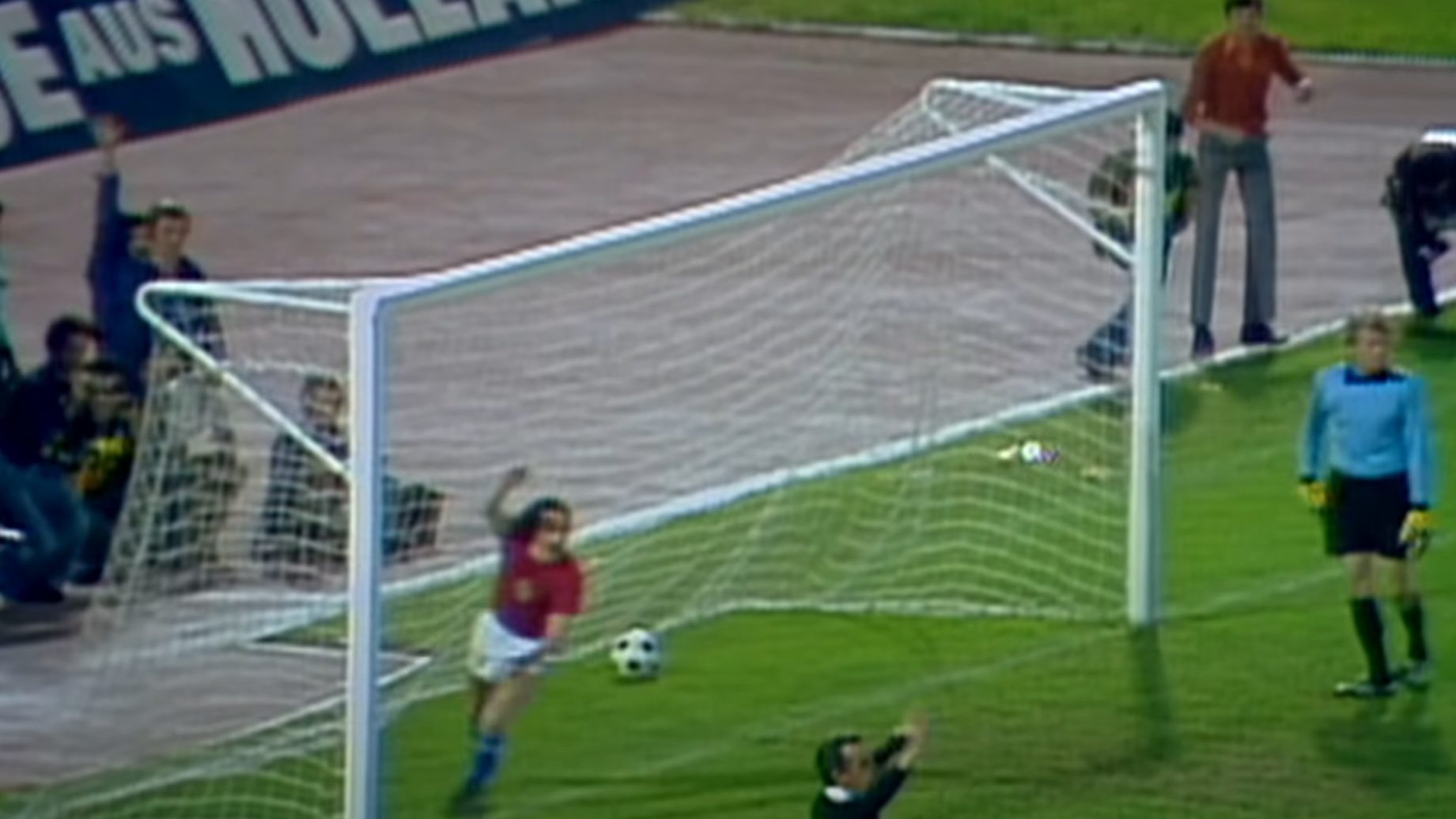Brazilian footballing legend Pele described him as “either a genius or a madman”. A French journalist hailed him “a poet”. Czechoslovakian football fans would accept either epithet, because whatever he was, Antonín Panenka’s chutzpah won them European football’s biggest prize.
In October 1990 the state once known as West Germany ceased to exist, when it was reunited with the eastern portion of the nation. Eleven months earlier, the Berlin Wall, symbol of the Iron Curtain that Winston Churchill once described as partitioning the European continent, had fallen. Germany was no longer divided.
On the last day of 1992, Czechoslovakia, a state formed in the aftermath of the First World War, also ceased to exist. But this time no nations were unified. In what became known as the Velvet Divorce, thanks to its peaceful denouement, the countries of Slovakia and the Czech Republic separated once again.
A decade and a half earlier West Germany had met Czechoslovakia on the football field, to contest the final of the 1976 European Nations Cup – what’s now popularly known as the Euros. There was little hint back then that either nation would so soon be extinct.
But the fall of communism across Eastern Europe in the late 1980s ensured Czechoslovakia carved for themselves a small piece of sporting history. They will forever remain the only Soviet satellite nation to have won a major international football tournament.
Of course, the baleful effects of politics constantly underpinned and undermined international sport throughout the Cold War. The Berlin Wall and its associated border running from the Baltic to the Mediterranean had long been an ideological tennis net over which both sides lobbed political drop shots. Governments used sporting success as a means to champion their political systems and bolster support among their populations.
Conversely, on occasion, sport was also used as a means for a nation oppressed to gain revenge on its persecutor. At the 1956 Olympic Games the Hungarian water polo team, having just witnessed the USSR’s invasion of its nation, took bloody retribution on their Soviet opposition in the pool.
And the following year, Poland were drawn against the USSR in a World Cup play-off match. It took place amid high tension after Polish president Władysław Gomułka’s public denunciation of Soviet socialist ideology. Furious Soviet premier Nikita Khrushchev first considered refusing to play but then issued clandestine instructions that Poland must lose. They duly did but not before the shins of the Soviet players paid the price of Khrushchev’s interference.
Onto 1976. Their route to the final pitted Czechoslovakia against the USSR via a two-legged quarter-final. And by now the Czechs too had good cause to exact retribution on the football field.
Eight years earlier, following Czechoslovak president Alexander Dubček’s attempts to liberalise his nation’s communist structures in what became known as the Prague Spring, Soviet leader Leonid Brezhnev had ordered troops and tanks across the border. Dubček and his government were overthrown. The Czechs had not forgotten.
The Soviets were determined to ensure there would be no successor to Dubček. Pretty much every person in Czechoslovakia realised their lives and their government was now being controlled from Moscow. The football field offered the nation a chance to show it had not acquiesced meekly.
Yet, the ferocity of the Czech play was tempered by their exceptional ability. Unlike the Hungarians and Poles, they wanted to exact revenge using their footballing prowess to humiliate a team that was ranked above them in the international standings. And they did just that. And this time there were no orders from the Russian leader.
After winning 2-0 in Bratislava in a match characterised by constant booing from the home crowd every time the opposition touched the ball, two first-half goals from Jozef Móder and Panenka, followed by resolute second-half defence, saw Czechoslovakia take a 2-0 lead to Kyiv. It was only their second victory over their political overlords.
Although the Soviet authorities refused to allow Czechoslovak supporters to travel to the second leg, a few expats living in the USSR bravely kept up the boos – it remains unreported whether they suffered any consequences. Móder once more proved to be the star. He scored twice (and was booked) as Czechoslovakia hung on for a 2-2 draw and aggregate victory.
Dissident western-domiciled journalist Ferdinand Peroutka, director of Radio Free Europe’s Czech division wrote: “I don’t follow football but I do follow the threads of justice. There was always going to be retribution for 1968. A nation avenged.” As George Orwell wrote: “War without the shooting”. By the end of the match the home crowd was booing its own team and a police guard was required to take the Czechoslovak players back to their hotel.
“It was our final,” says 78-year-old Jaroslav Šulc, football fan and former sports administrator from Prague. “After that, we didn’t really care. We didn’t think that we might go on and win it.”
But when Czechoslovakia overcame the Netherlands in the semi-final, setting up a showdown with world champions West Germany, what had once seemed improbable now became a possibility.
But now the players found themselves with a political and patriotic dilemma. Should they uphold the integrity and prestige of their nation and go all out to win the game, or would that be playing into the hands of the Soviet puppet government in Prague? On the other hand, Czechoslovakia had suffered dreadfully at the hands of the Germans during the second world war. That too was not easily forgotten.
In the end, the players chose to play for the pride of the people of their nation, not the government, not any external forces. “Our personal honour was at stake too,” said goalkeeper Ivo Viktor. They would go out to play. And to win.
The final was in Belgrade, Yugoslavia – ironically another nation that no longer exists. And what a denouement it was.
West Germany, the holders, were almighty favourites and played their role in a match for the ages. The end-to-end game of footballing cliché saw Czechoslovakia take the game to their more illustrious opponents and by half-time they had taken a 2-1 lead thanks to goals from Ján Švehlik and Karol Dobiaš, Dieter Müller replying for West Germany with a close-range volley.
And then, as the second half ticked inexorably away, came the inevitable. With only seconds left, and Czechoslovakia hanging on, an inswinging corner found the head of Bernd Hölzenbein. The Germans drew level. Extra time produced no more goals and the game came down to penalties, the first major international tournament to do so.
“We all knew what was coming,” says Šulc. “History has taught us what happens when Germany are in a penalty shoot-out.” The German record was indeed phenomenal, but that day in 1976 would prove to be a rare anomaly. When Bayern Munich’s Uli Hoeness skied his kick, it was sudden death. Up stepped Antonín Panenka.
Scholars of football history are well-versed in what happened next. “Goalkeepers always dive one way or the other for a penalty kick,” he said afterwards. But Panenka didn’t simply take advantage of this, it was the manner in which he did it.
Instead of hoofing the ball straight into the middle of the goal as Sepp Maier dived to the left, he gently chipped it towards the net and it looped sedately over the line. The most unexpected of victories sealed in the most unexpected way.
The two teams – or their direct successors – would meet once more in a European Championship final, at Wembley in 1996. This time the tables were turned as a united Germany defeated the Czech Republic 2-1. Panenka was a guest of honour.
“People still ask me today, about that kick,” he says. “Was I thinking about what had gone before, the 1968 invasion, the Russian matches, the future of my homeland… Well, no I wasn’t. All I was thinking about was how the hell did it all come down to me? I was terrified. So nervous I just couldn’t kick the ball any harder.”
Readers can make their own judgement as to whether or not he is teasing. Irrespective, his legacy is secured through synonymy. His style of penalty kick begat a neologism. It’s now known as “a Panenka”.












